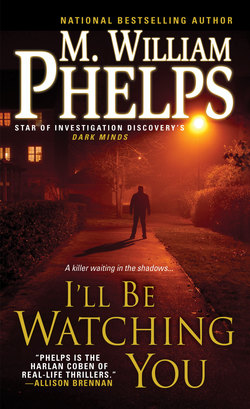Читать книгу I'll Be Watching You - M. William Phelps - Страница 29
На сайте Литреса книга снята с продажи.
19
ОглавлениеI
As she struggled to stay conscious in the emergency room, doctors secured Mary Ellen’s wounds and gave her a sedative so she could fall asleep and get some rest. This, while they figured out if they could save her life.
Several moments later, as Mary Ellen started coming to, she saw a man heading into her room. His hair was cut in a fashion similar to Ned’s. Mary Ellen, groggy and drunk from the sedative, believed he was even the same height, that he looked like Ned.
Oh, my God… (“I was terrified it was him.”)
Whenever Mary Ellen became frightened, she held her breath. It was part of being consumed by fear and anxiety that she had lived with most of her adult life.
There was another man behind the man who looked like Ned; they were heading for her. Holding her breath, Mary Ellen realized they were detectives and she started to cry, pleading, “Please find him. He’s going to kill somebody. He tried to kill me.”
Ned was like a snapshot in her mind. Doped up and suffering post-traumatic stress, she rattled off a description: “A blue paisley design on a red tie…white oxford cloth, button-down shirt. A navy blue suit.” He had “California good looks,” she said later. “Blond hair and blue eyes.”
Doctors weren’t going to allow such nonsense: cops questioning Mary Ellen so soon. She was in no condition to talk. “You must leave this room right now,” her doctor said.
II
The way he felt, it was like running up a flight of stairs. Or taking an entire bottle, he explained, of “pep pills.” A combination of “an electric shock and having someone sneak up behind you” and startle “the daylights out of you.” That was how Ned explained it—that sensation when “I felt her throat in my hands.” He wasn’t talking about Mary Ellen. He was speaking of another woman—a woman he had killed four years before he met Mary Ellen. Like a hunter, he claimed it was his first kill. But cops, investigators, and profilers in the years to come would beg to differ.
As he later wrote to a judge and described these feelings, Ned said he could barely contain himself while writing the words. He could feel that adrenaline once again just writing about it, racing through [his] heart, hands and legs.
Words on a page had done it for him. He was picturing it all as he sat in his cell and wrote. Doing the actual deed of murder, Ned explained, was another thing entirely. Actually strangling a woman, he said, was nothing like it was portrayed in films. It was practically impossible to kill someone with your bare hands, he wrote. Sure, he continued, a football player could probably do it because he had “huge hands.” But Ned was certainly no football player.
He had killed a woman and gotten away with it for several years before he met and attacked Mary Ellen. He had floated the notion in his head of getting “professional help,” but it had been, for him, such a “terrible experience,” and he was “so thankful” not to be arrested, that although he still had those crazy, violent, sexual “urges,” he had “convinced” himself that he would “never allow” a situation to develop where the potential was there for him to “lose control ever again.”
That was, of course, until he met Mary Ellen.
III
As he pulled into his driveway after attacking Mary Ellen, Ned had to hope that she would die in the hospital. Because if Mary Ellen Renard lived, Ned Snelgrove was going to jail.
IV
It was four in the morning when Diana Jansen, Mary Ellen’s youngest daughter, heard what had happened to her mother. The hospital called. “Your mom’s been attacked,” a nurse said.
Diana had a nine-month-old child and was pregnant with her second. She didn’t need drama. Not now. Her first child had been born premature—one would have to think it was because of all the stress she had been under her entire life, which had already been, as Dianna described it, “unbelievable.”
So this is how it’s going to end, Diana thought after hanging up the phone.
How scripted. How perfect, really. It was as if their entire lives had led up to this one moment. After everything, here was Mom, killed by an attacker.
V
When the fog left and Diana realized that her mother had been stabbed by a stranger and could die, she frantically began looking for a way to get from her home in Pennsylvania, where she lived with her husband and child, to New Jersey. She needed a babysitter. Oh, my God, she thought, oh, my God. How am I going to get there fast enough?
Then the spasms of guilt washed over Diana. I shouldn’t have left her alone down there…. Why did I not take her up here with me? (“I’ve been guilt-ridden my whole life,” Diana said later. “This just escalated that feeling.”)
Diana called the hospital. She didn’t know what else to do. Her mother needed her. In many ways, Diana felt as if she had taken care of Mary Ellen.
Now her mother was in the hospital after being violently attacked, and no one was with her.
“Mom?” Diana said when she heard a voice on the line. “That you?”
Mary Ellen was crying. She didn’t know what to say. Perhaps she couldn’t speak.
“Mom, I love you. I’m on my way down there. I’ll be there as soon as I can.”
